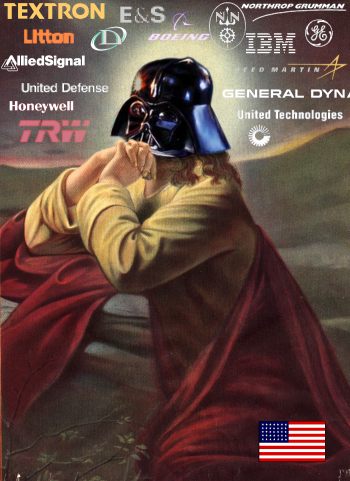 |
Andy Deck | |||
|
"We have just seen the first war of the 21st century. Now that a war has been declared on us, we will lead the world to victory, to victory." "America was targeted for attack because we're the brightest beacon for freedom and opportunity in the world. And no one will keep that light from shining." "We will not succumb to the desires of these terrorists." What were the desires of the terrorists who destroyed the World Trade Center and part of the Pentagon? By most accounts their actions were an "attack on America." If one is to take the American President seriously, they were attacking "freedom and opportunity." These saber-rattling declarations do little to elucidate the causes of the events and the prospects for winning this new "war." As with the so-called "war on drugs" the rush to expand military and covert activity in order to defeat shadowy terrorist enemies does not address root causes. Just as the demand for drugs continues unabated, the misery and indignation that fuel terrorist attacks will not be stifled by a prolonged and costly campaign of high-tech vigilantism. Quite the contrary. It is probable that the Bush administration's "long war" approach will lead to an escalating cycle of violence.
Yet the swift official response was to try to contextualize events in the familiar frame of war. There is cause to doubt that this is appropriate. "According to the facts in the public record," writes international law scholar Francis Boyle, the events The first task, achieved with the help of sensationalistic news media, was to get Americans to accept the war metaphor. Then, as with every American war in recent memory, questions of why were immediately cast aside in order to concentrate full attention on winning, however sloppy the retaliatory measures. The American people have been assured time and again that the terrorists were very sophisticated. This propaganda is both a face-saving measure (how, after all, could America's $30-billion per year anti-terrorism activities have been so unsuccessful?) and a rationale for the declarations of war. A rationale is needed for the term "war" because the enemy, in this case, is not clearly identifiable. In order to resolve the narrative logic of revenge, the Administration searches, like action film-makers in the 90's, for a convincing post-Cold War enemy. But this time, there is no formidable Iraqi army, no weapons of mass destruction to destroy. Aside from the guilty, who may be very few in number, the unfortunate people who serve as proxy-enemies in this agonizing script are the people of Afghanistan, already beset with the ravages of drought and civil war. Prolonged drought has sent nearly a million Afghans - about 5 percent of the population - on a desperate flight from hunger. Some have gone to other Afghan cities, others across the border. More than one million are "at risk of starvation," according to the United Nations. 2As with Palestinians and Iraqis, things could not get much worse for the Afghans. Initially, the use of the awesome force of the US military against the people of Afghanistan may receive broad diplomatic approval, partly out of fear and intimidation. But sympathy and tolerance for American assaults on third world countries will not last long, especially outside of Europe. Then it will only be a matter of time before the Bush administration's hard-line policies will motivate more extremists to send more warning signals to Washington. In embarking upon this new "war" against terrorism it is important to recognize that leveling Afghanistan will not eliminate terrorism. Perhaps it is a good time to begin evaluating why Americans are being targeted in the first place.  In the days and weeks following the tragedy, America's talking heads often avoided the question. Their live -- but evasive -- war coverage focused on rescue and retaliation. When they did occasionally assess the motives for the attack, many expressed bewilderment. But if one endeavors to sort out the realpolitik, a picture emerges that is far less abstract, "incomprehensible," and "unthinkable" than American media pundits suggest. With regard to the Middle East, as elsewhere, the present Bush administration has inherited abrasive alliances, and it has maintained them. But it has also generated new problems. There are many policy vectors that are relevant to the rise of anti-American sentiment, and it would be foolish to neglect their relation to the "war" against terrorism.
Americans should understand that many Arabs and Muslims are tired of seeing Palestinians being killed, humiliated, and vilified, while the U.S. supports the violent agenda of Ariel Sharon. The U.S. vetoes U.N. resolutions condemning Israeli killings. This slanted perspective suggests that when Israelis kill they are innocent, whereas Palestinians are always terrorists. Likewise, apart from Great Britain, the coalition that supported the Gulf War does not support the continued U.S. bombing in Iraq, let alone the economic embargo which has fostered a child and infant mortality crisis of genocidal proportions.
Instead of using September 11th as a cause to reevaluate imperialistic and internationally unpopular American foreign policies, the Bush administration is using the events as an opportunity to boost expenditure on weapons, surveillance, and security. Billions of dollars are earmarked for "retaliation." Ultimately this insures the continuation of violent conflict. This posture can hardly be viewed as a surprise, however, because Bush has pushed aggressively to increase military spending and to provoke new arms races ever since he came to power. Summarizing the situation, Noam Chomsky writes,
 Rather than fanning the flames of global militarism with billions of dollars of new kindling, it is time to change course. Generally, this means demilitarizing, reducing weapons sales, and ending cynical strategic policies inspired by a vision of corporate globalization and natural resource control. Rather than adopting the blood thirsty howl for vengeance, it is imperative to resist the hard-right militarization of civil society, and to try to move G8 policy in directions that will diffuse the hatred that has given rise to this terrorism. By ignoring Seattle, Genoa, and other peaceful protests; by remaining the world's number one arms exporter, the world's number one polluter, and the world's number one developer of space-based weapons, the U.S. continues on a road that will not eliminate terrorism, but rather, will exacerbate it.   It would be nice to believe that the events of September 11th would give American leaders -- primarily the Vice President and the President's advisors -- cause to reflect on their unilateral, arrogant, and antagonistic foreign policies. But unfortunately, it appears that they are too consumed by their militarist fantasies about world domination to realize that they themselves have helped to bring the events about. Indeed the corporate hawks who now lead the U.S. may not be too displeased by the surge of terrorist tensions. Popular, non-violent resistance to various policies will now be treated even more convincingly as a security threat. The climate for peaceful dissidence has become more complicated. The heavy-handed policing that was already becoming standard procedure at each gathering of the World Bank or G8 leaders will likely become even less tolerant. The war on terrorism, in this light, becomes a center-piece in the controlling logic that exploits the fearful American people to finance a perpetual state of emergency, wherein the U.S. military and secret services police the whole world to make it safe for corporate globalization. Along with this permanent conflict comes collateral damage to justice and peace. Should events continue as now appears inevitable, the costs of Bush's jingoist solutions will be great. Vengeance is a dangerous catalyst. World wide war is war without winners.
Notes
|
||||
